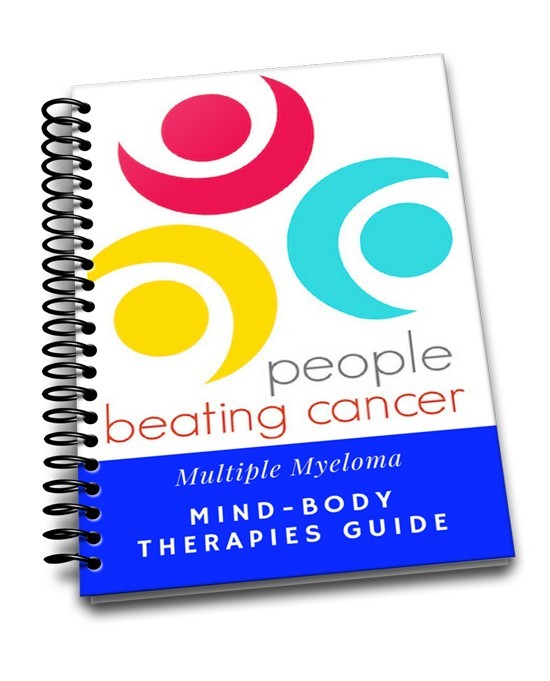
Recently Diagnosed or Relapsed? Stop Looking For a Miracle Cure, and Use Evidence-Based Therapies To Enhance Your Treatment and Prolong Your Remission
Multiple Myeloma an incurable disease, but I have spent the last 25 years in remission using a blend of conventional oncology and evidence-based nutrition, supplementation, and lifestyle therapies from peer-reviewed studies that your oncologist probably hasn't told you about.
Click the orange button to the right to learn more about what you can start doing today.
- You are here:
- Home »
- Blog »
- non-conventional therapies »
- Multiple Myeloma Therapy- Feeling Grateful- WTF!?
Multiple Myeloma Therapy- Feeling Grateful- WTF!?

“Evidence suggests that we can actively choose to practice gratitude — and that doing so raises our happiness (and heals MM?)…”
Let’s be honest. Being diagnosed with multiple myeloma (MM) is difficult. MM patients, survivors and caregivers don’t have much to feel grateful about. Your oncologist will push surgery, chemotherapy and radiation as the only multiple myeloma therapy for you.
If you achieve remission following induction therapy you might feel something approaching gratitude. But you know that conventional oncology considers MM to be incurable. You know that all MM patients relapse.
Try to look at things differently. Try to take a different approach. Can’t do any harm, right?
If you can feel grateful you will be happier. If you are happier you will heal faster, and live longer.
- If you eat cleanly, you will feel better.
- If you exercise regularly you will also feel happier.
- If you practice mind-body therapies you will feel better.
You have an incentive to try to feel grateful and you have an incentive to exercise frequently.
PeopleBeatingCancer is all about actionable information. By actionable I mean that multiple myeloma patients, survivors and caregivers can read my blog posts and books and learn the research shown to benefit MM patients.
The articles linked and excerpted below will give you methods to actually feel grateful. I myself take some of the steps talked about below. And it works. I feel grateful and I am happier. And I’ve been living with multiple myeloma since ’94. I live with a host of collateral damage caused by conventional therapies that did little to slow my cancer. But that’s another blog post.
Here is to feeling grateful. And feeling happier because of it. To learn more about mind-body therapies to help you manage your cancer, scroll down the page, post a question and I will reply ASAP.
Thank you,
David Emerson
- Multiple Myeloma Survivor,
- MM Cancer Coach,
- Director PeopleBeatingCancer
Recommended Reading:
- Mind-Body Therapy- Essential Reading for the Newly Diagnosed Myeloma Patient
- Multiple Myeloma Cancer Coaching-Mind-Body, Spirituality Therapy
- Late Stage Chemobrain for Multiple Myeloma?
Choose to Be Grateful. It Will Make You Happier.
“…For many people, gratitude is difficult, because life is difficult. Even beyond deprivation and depression, there are many ordinary circumstances in which gratitude doesn’t come easily. This point will elicit a knowing, mirthless chuckle from readers whose Thanksgiving dinners are usually ruined by a drunk uncle who always needs to share his political views. Thanks for nothing.
Beyond rotten circumstances, some people are just naturally more grateful than others. A 2014 article in the journal Social Cognitive and Affective Neuroscience identified a variation in a gene (CD38) associated with gratitude. Some people simply have a heightened genetic tendency to experience, in the researchers’ words, “global relationship satisfaction, perceived partner responsiveness and positive emotions (particularly love).” That is, those relentlessly positive people you know who seem grateful all the time may simply be mutants.
But we are more than slaves to our feelings, circumstances and genes. Evidence suggests that we can actively choose to practice gratitude — and that doing so raises our happiness….
Evidence suggests that we can actively choose to practice gratitude — and that doing so raises our happiness….
It’s science, but also common sense: Choosing to focus on good things makes you feel better than focusing on bad things…
Next, move to “exterior gratitude,” which focuses on public expression. The psychologist Martin Seligman, father of the field known as “positive psychology,” gives some practical suggestions on how to do this. In his best seller “Authentic Happiness,” he recommends that readers systematically express gratitude in letters to loved ones and colleagues…
When Does Gratitude Bring Better Health?
“…health-care workers who cataloged why they were grateful experienced a 28% reduction in stress, and that writing about gratitude halved the risk of depression in those with a history of the disease…
In the study, reported in 2003 in the Journal of Personality and Social Psychology, prompting people to list five things they were grateful for several times a week not only brought an uptick in mood but also resulted in subjects devoting more time to exercise and to helping others….”


